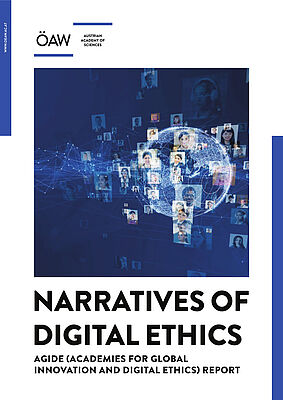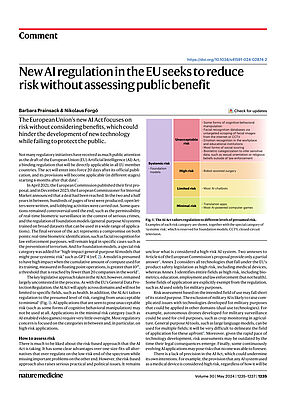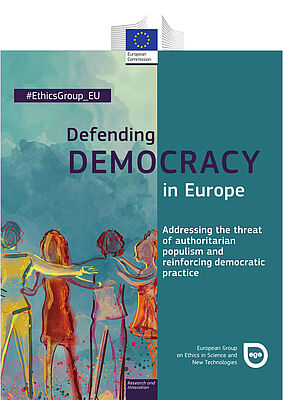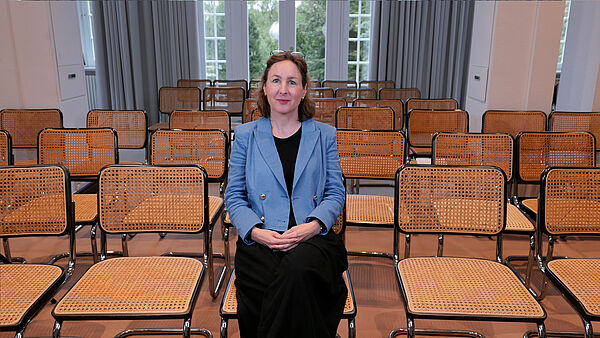
Barbara Prainsack, Dr. phil.
Professor for Comparative Policy Analysis
University of Vienna
Born in 1975 in Klagenfurt, Austria
Studied Political Science at the University of Vienna
Project
Caring States: Solidarity in a Turbulent World
The book that I plan to write at the Wissenschaftskolleg will build upon my and colleagues’ work on solidarity, but expand it in significant ways. It is tentatively titled “Caring states: Solidarity in a turbulent world.”For a Report for the Nuffield Council on Bioethics (NCOB) in 2011, I developed a working definition of solidarity that was intended to strengthen the analytical power of the concept and enhance its value for policy making. Drawing on practice epistemology, I proposed a framework that helps to understand where, why, and how solidaristic practices emerge and how they solidify into social, legal, and other institutions.
In the following years, together with colleagues from various disciplines, I have developed our conceptual approach to solidarity further and used it to think and work through regulatory and social problems in different areas, including data governance, epidemics, and the future of work – all against the backdrop of digital transformations. My book will draw upon insights from these projects, as well as on current work with colleagues on all continents who seek to foreground non-European traditions of solidarity scholarship and practice. Specifically, my monograph will explore what solidarity can do to tackle current transboundary problems such as health crises, climate change, and democratic backsliding. If we understand solidaristic institutions as those that people contribute to according to their abilities and receive support as they need it, can solidarity help us envisage a new welfare state, without the known bureaucratic problems and unintended consequences? Can it help to address the problem of climate change? Can it help to protect people’s rights and interests in the digital era more effectively? Finally, how can public institutions be inclusive beyond current limits of citizenship and other categories of exclusion? Can solidarity help to create “caring states”?
Recommended Reading
Prainsack, Barbara (2017). Personalized Medicine: Empowered Patients in the 21st Century? New York: New York University Press.
Prainsack, Barbara, and Alena Buyx (2017). Solidarity in Biomedicine and Beyond. Cambridge: Cambridge University Press.
Prainsack, Barbara, Seliem El-Sayed, Nikolaus Forgó, Łukasz Szoszkiewicz, and Philipp Baumer (2022). “Data Solidarity: A Blueprint for Governing Health Futures.” The Lancet: Digital Health 4 (11): e773–e774. https://doi.org/10.1016/S2589-7500(22)00189-3.
Colloquium, 11.06.2024
What is Solidarity, and Why do We Need It? From Pandemics to Climate Change
Until a few years ago, solidarity seemed an outdated concept to many – a battle call of the past. During the COVID-19 pandemic, things changed: politicians, business leaders, and public health advocates all over the world appealed to solidarity when calling upon people to wear masks, get vaccinated, or take care of each other. International organizations and governments claimed to “act in solidarity” when sharing vaccines or providing aid. Solidarity became one of the terms most strongly associated with the pandemic, and one of the most controversial: for some, in times of multiple crises, solidarity is vitally important for the functioning of societies, both in the form of individual practices and in the form of solidaristic institutions. For others, solidarity is a tool of oppression.
What is solidarity, and why should we care? These are the questions that I will address in my colloquium. I will provide a definition of solidarity and discuss how solidarity is different from other prosocial concepts such as justice and care. Identifying circumstances under which solidarity becomes problematic and giving examples of how “authentic” solidarity, in contrast, can increase people’s capacity to care for themselves and for others, I will argue that explicit attention to the dynamics of solidarity can improve policy making and policy outcomes. Using examples from my current research, I will show how looking at societal challenges through the lens of solidarity can change the way we frame a problem and, thus, how we address it.
Publications from the Fellow Library
Prainsack, Barbara (Wien, 2024)
Narratives of digital ethics : AGIDE (academies for global innovation and digital ethics) report
Prainsack, Barbara (Luxemburg, 2024)
Prainsack, Barbara (New York, NY, 2024)
New AI regulation in the EU seeks to reduce risk without assessing public benefit
Prainsack, Barbara (Wien, 2024)
Arbeit - Care - Grundeinkommen kritik & utopie
Prainsack, Barbara (Colchester, 2023)
European Solidarity : interdisciplinary perspectives
Prainsack, Barbara (Wien, 2023)
Wofür wir arbeiten Auf dem Punkt
Prainsack, Barbara (London [u.a.], 2022)
Data solidarity : a blueprint for governing health futures
Prainsack, Barbara (Bristol, 2021)
The pandemic within : policy making for a better world
Prainsack, Barbara (Wien, 2020)
Vom Wert des Menschen : warum wir ein bedingungsloses Grundeinkommen brauchen
Prainsack, Barbara (Thousand Oaks, Calif., 2019)
Logged out : ownership, exclusion and public value in the digital data and information commons
Made at Wiko 07/03/24
Made at Wiko 03/18/24
Made at Wiko 02/27/24
Köpfe und Ideen 2024
“I am not idealizing solidarity”
Barbara Prainsack in an interview with Matthias Pfeffer




![[Translate to English:] Portrait von Barbara Prainsack](/fileadmin/_processed_/0/4/csm_240227mw396532HIGH_d1afe12489.jpg)